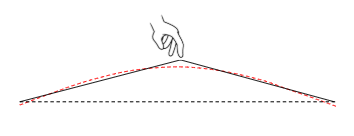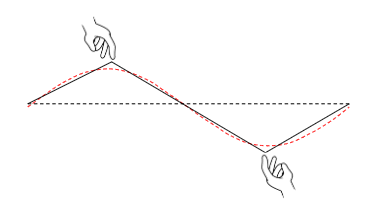Why, when we play a string, almost all of the energy we give them is ''used'' in the first harmonic (the fundamental frequency) rather than be distributed between all of them?
1 Answer
It depends on how you pluck the string.
Typically when we pluck a string the string immediately before release looks something like this (I've exaggerated the vertical scale for clarity):
When you pluck the string you pull it into a triangular shape. I've drawn the fundamenal sine wave in the background as a red dashed line, and you can see the shape of a string is pretty close to the fundamental sine wave.
Suppose instead of plucking string as I've shown you used two hands and pulled the string something like this:
Now the starting shape of the string is not at all like the fundamental and more like the first overtone. If you plucked the string this way you'd find most of the energy was in the first overtone and not in the fundamental.
-
$\begingroup$ Here is a nice Java simulation (pluck it with the mouse): falstad.com/loadedstring/index.html $\endgroup$– user137289Commented Mar 26, 2019 at 17:32
-
1$\begingroup$ Thank you, this really makes sense to me. But why when increasing frequency, the amplitude decrease? Is it because the energy of a wave with greater frequency is also greater so the amplitude has to decrease to stay the same? $\endgroup$ Commented Mar 29, 2019 at 14:32


